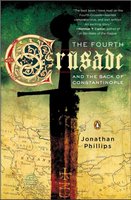The Fourth Crusade

I just finished The Fourth Crusade and the Sack of Constantinople by Jonathan Phillips. The interesting thing about this book is that Phillips digs deep into contemporary documents and finds that much modern criticism of the crusades is ill-informed. The crusaders may not have been crude barbarians who massacred the refined Muslim community (or in this case, the refined and exquisite Byzantine empire). Instead, Phillips shows that the crusaders were inspired to take up the cross primarily on account of their religious convictions.
In the case of the Fourth Crusade, what everybody considers to be the greatest debacle of the later middle ages, Phillips paints a fully-orbed picture of the reasoning, moral justifications and pressures that led up to the crusader's attack on the greatest Christian city of the age. From my reading, it seems that bad planning, unfortunate circumstances, and a persistent sense of chivalry were the main factors in the decision to move the crusade to Constantinople. Some would say that greed was also a primary motivator, but after reading Phillips, it seems to be ancillary. Greed apparently took over once the expedition went sour, no other options were beckoning and the glitz of Byzantium mocked the crusaders from across the Golden Horn waterway. But prior to this, the main concern was always to save the Holy Land from the Muslims.
Of course, the decision to take back land at the expense of the lives of those living there is not easily justifiable, if it ever is. But by removing the cyncism that surrounds most modern interpretations of the event, Phillips helps the reader to get inside the crusaders' heads, so to speak, and to see them as human beings. This is beneficial because so much rhetoric about the current war in Iraq revolves around the West's historic beating-up of the East. If we can cast both sides in equal lighting (indeed, Islam settled in Jersusalem only after overthrowing the original occupants), the strength of these condemnations will wither and a clearer picture will emerge.
On a stylistic note, Phillips has a flowing prose that enlivens the text with sometimes over-the-top imagery (witness the line pulled for the back of the paperback edition: "The crusaders
 spread in to the city like a deadly virus running through the veins of an old man"). I liked how he exploited incidental details of life and warfare by turning them into full paragraphs on the subjects. This gave the reader a good sense of how life was lived and what tools humans had to work with (psychologically as well as physically) during the period. And of course, the tactical discussions are engrossing - especially when the reader considers that a force of 20,000 sacked a city of 500,000. And also impressive: the ingenuity of Doge Dandolo, who was not especially revered by the papacy or anyone else not from Venice or on the crusade itself.
spread in to the city like a deadly virus running through the veins of an old man"). I liked how he exploited incidental details of life and warfare by turning them into full paragraphs on the subjects. This gave the reader a good sense of how life was lived and what tools humans had to work with (psychologically as well as physically) during the period. And of course, the tactical discussions are engrossing - especially when the reader considers that a force of 20,000 sacked a city of 500,000. And also impressive: the ingenuity of Doge Dandolo, who was not especially revered by the papacy or anyone else not from Venice or on the crusade itself.Best for me, I now have a sufficient background on the crusade to read some other fun and related books, like Eco's Baudolino or Lawhead's The Celtic Crusades trilogy, and understand the enormity of the crusade's impact. Other recommendations here are always welcome.
This is the christening entry, and as a standard, not all entries have to be this long or serious (by serious I mean formal, not necessarily intellectually high-octane). Or they can be longer and more serious. Whichever works.
- Roger Dixon
2 Comments:
Rogelioslush:
Your writing is incisive; however, I must be cavil and make a few stylistic suggestions.
1. I would put the first sentence in the perfect rather than simple past (i.e. have just finished).
2. Sentence two has too many "The's" "this's" and "that's".
3. Sentence two uses the verb "is" twice... spice things up a little.
4. "take up the cross" sounds a little cliche.
5. Para 2, sent 1: do you really consider Constantinople to be the greatest Christian city of the age? What about Rome?
6. "From my reading" = bumpy transition.
7. "some would say" sounds a little cliche.
8. "some would say" and "it seems" sound too subjuctive.
And so on....
I appreciated your spunky and simple writing style. It was fun to read!
Pommes - thanks for the enlightening suggestions and (modest) praise. Of couse, an original contribution to this page would be most welcome.
Post a Comment
<< Home